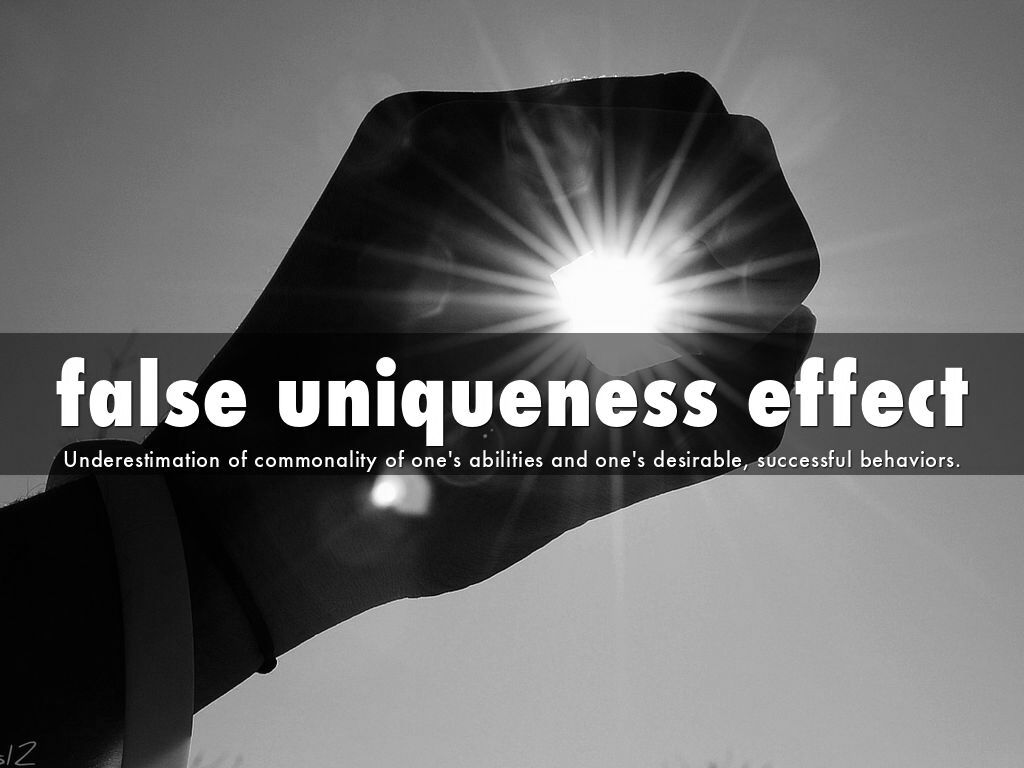Introduction
In the complex landscape of human decision-making, numerous cognitive biases shape our choices, often leading us astray from rationality. One such bias is the false uniqueness effect, a psychological phenomenon that influences our perception of individuality and leads us to believe that our characteristics, abilities, and experiences are more unique than they actually are. In this blog post, we will delve into the false uniqueness effect, exploring its relevance in decision-making processes and its prevalence in our day-to-day lives.
Understanding the False Uniqueness Effect
The false uniqueness effect refers to the tendency of individuals to believe that they possess uncommon attributes or exhibit rare behaviors, leading them to perceive themselves as more exceptional than others. This bias arises from our innate desire for positive self-evaluation and a need to stand out from the crowd. As a result, we often overestimate our own uniqueness while underestimating the similarities we share with others.
Relevance in Decision-Making
The false uniqueness effect significantly impacts decision-making processes in various domains of life. By distorting our perception of reality, this bias can lead us to make irrational choices that are contrary to our best interests. Understanding its impact is crucial for avoiding costly mistakes and achieving more objective decision-making outcomes.
Examples of the False Uniqueness Effect
- Personal Life Decisions: Consider an individual contemplating a career change. The false uniqueness effect may lead them to believe that their talents and aspirations are unparalleled, resulting in overconfidence and a disregard for the challenges others may have faced in similar transitions. Consequently, they may underestimate the risks involved, leading to a hasty decision without considering alternative paths or the experiences of others who have gone through similar transitions.
- Business Scenarios: In the realm of entrepreneurship, the false uniqueness effect can cloud judgment when assessing market opportunities. An entrepreneur may mistakenly believe that their product or service is one-of-a-kind, failing to recognize similar offerings already available or the challenges faced by competitors. This overestimation of uniqueness can lead to a lack of market research and a failure to adapt to consumer needs, ultimately hindering business success.
- Public Policy-Making: Governments and policymakers can also fall victim to the false uniqueness effect. When designing public policies, they may perceive their jurisdiction as inherently distinct from others, leading to the assumption that solutions proven effective elsewhere will not apply to their region. This bias can impede the adoption of evidence-based practices, resulting in inefficient policy implementation and missed opportunities for positive change.
Psychological Underpinnings and Biases
The false uniqueness effect is closely tied to several psychological biases that contribute to its occurrence. One such bias is the self-serving bias, where individuals attribute their successes to internal factors while blaming external factors for their failures. This bias fuels the illusion of uniqueness, as individuals magnify their own positive attributes while downplaying their similarities to others.
Furthermore, the false consensus effect also plays a role in the emergence of the false uniqueness effect. This bias leads individuals to overestimate the prevalence of their own opinions, beliefs, or behaviors in a larger population. When combined with the self-serving bias, it reinforces the notion that one’s characteristics are truly exceptional.
Identifying and Avoiding the False Uniqueness Effect
To overcome the false uniqueness effect, it is essential to cultivate self-awareness and engage in critical introspection. Here are some practical strategies to help identify and avoid this bias:
- Seek Diverse Perspectives: Actively seek out opinions and feedback from others, recognizing that your experiences may not be as unique as you initially believe. Engaging in dialogue with a diverse group of individuals can broaden your understanding and challenge your assumptions.
- Embrace Humility: Foster a mindset of humility by acknowledging that your abilities, talents, and experiences are shared by many others. By embracing a more realistic perception of your own uniqueness, you can make more objective decisions based on a broader perspective.
- Engage in Perspective-Taking: Put yourself in the shoes of others who have faced similar situations or made comparable decisions. By understanding their challenges and outcomes, you can gain valuable insights and avoid the pitfalls of the false uniqueness effect.
- Collect and Analyze Data: Rely on data-driven decision-making to reduce the influence of subjective biases. Gathering and analyzing relevant information can provide a more accurate understanding of the situation at hand, allowing for a more objective assessment of uniqueness and potential outcomes.
Conclusion
The false uniqueness effect, rooted in our psychological biases, can have a profound impact on decision-making processes. By distorting our perception of uniqueness, this bias can lead us to make irrational choices that are not aligned with reality. Recognizing the prevalence of this bias and adopting strategies to overcome it can help individuals and organizations achieve more accurate and effective decision-making outcomes. Awareness and active avoidance of the false uniqueness effect are key to navigating the complexities of decision-making with clarity and objectivity.
